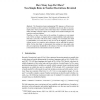Free Online Productivity Tools
i2Speak
i2Symbol
i2OCR
iTex2Img
iWeb2Print
iWeb2Shot
i2Type
iPdf2Split
iPdf2Merge
i2Bopomofo
i2Arabic
i2Style
i2Image
i2PDF
iLatex2Rtf
Sci2ools
139
click to vote
LPAR
2007
Springer
2007
Springer
How Many Legs Do I Have? Non-Simple Roles in Number Restrictions Revisited
Abstract. The Description Logics underpinning OWL impose a well-known syntactic restriction in order to preserve decidability: they do not allow to use nonsimple roles—that is, transitive roles or their super-roles—in number restrictions. When modeling composite objects, for example in bio-medical ontologies, this restriction can pose problems. Therefore, we take a closer look at the problem of counting over non-simple roles. On the one hand, we sharpen the known undecidability results and demonstrate that: (i) for DLs with inverse roles, counting over non-simple roles leads to undecidability even when there is only one role in the language; (ii) for DLs without inverses, two transitive and an arbitrary role are sufficient for undecidability. On the other hand, we demonstrate that counting over non-simple roles does not compromise decidability in the absence of inverse roles provided that certain restrictions on role inclusion axioms are satisfied.
| Added | 08 Jun 2010 |
| Updated | 08 Jun 2010 |
| Type | Conference |
| Year | 2007 |
| Where | LPAR |
| Authors | Yevgeny Kazakov, Ulrike Sattler, Evgeny Zolin |
Comments (0)

